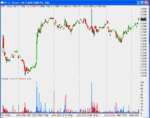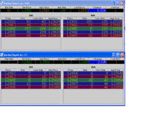JumpOff
1
- Messages
- 702
- Likes
- 14
Here's my summary of what's been reported so far (with a few pieces of information gleaned from other threads):
Its easier to have a decent relationship with your broker, when you use a regulated firm. That probably means trading the forex <b>futures</b> on theGLOBEX exchange at the CME. So what's different?
Globex contracts are not limited like other commodity futures contract (the exchange doesn't have any artificial 'circuit breakers' to stabilise the price - it is tied very closely to the interbank forex) And the forex futures trade the same hours as Forex, but with less liquidity during parts of the day/night when most people are asleep.
The smallest thing you can trade in the futures arena is the e-mini EURO (ticker sign is E7). It's 62,500 Euros per contract, so that is $6.25 per tick. Looks like minimum accounts for retail traders is about 3K, maintenance margin on one contract is about $1,200. (seems like too small a minimum to handle even one contract if you ask me...) For a small trader, looks like commissions ($11 round trip) and spread of 1 pip are to be expected. (So figure 2 pips/trade) Futures contracts also have volume data, which you can't get on a straight forex position. I have never seen a futures broker say that they are willing to guarantee that you won't have to pony up additional margin if something goes wrong.
The retail forex shops have a smaller margin and initial account minimums, and you can trade a 0.1 contract with them (one pip = $1). They also say they guarantee no debit balances (they'll pull the plug automatically if your margin gets too low). There spreads are bigger (3-5 pips for the EUR/USD) - and there is no commission.
Both offer demo accounts,webtrading platforms, charts, news, feeds, etc..
Seems like the retail forex shops are designed for those who are new to forex, who want to dabble or to run through a proof of concept exercise with the minimum amount of $$$. Or for those who just want to plow in and lose the money quickly 😉 The Futures route may allow you to lose more money even faster if you work it right....
If I had real money on the line, I'd want a regulated broker.... There also seem to be regulated Commodity Futures Trading Commission (CFTC) and the National Futures Association (NFA) brokers who also offer the retail unregulated forex options... That would be my second choice if I felt like I didn't want to do the futures for some reason.
JO
Its easier to have a decent relationship with your broker, when you use a regulated firm. That probably means trading the forex <b>futures</b> on theGLOBEX exchange at the CME. So what's different?
Globex contracts are not limited like other commodity futures contract (the exchange doesn't have any artificial 'circuit breakers' to stabilise the price - it is tied very closely to the interbank forex) And the forex futures trade the same hours as Forex, but with less liquidity during parts of the day/night when most people are asleep.
The smallest thing you can trade in the futures arena is the e-mini EURO (ticker sign is E7). It's 62,500 Euros per contract, so that is $6.25 per tick. Looks like minimum accounts for retail traders is about 3K, maintenance margin on one contract is about $1,200. (seems like too small a minimum to handle even one contract if you ask me...) For a small trader, looks like commissions ($11 round trip) and spread of 1 pip are to be expected. (So figure 2 pips/trade) Futures contracts also have volume data, which you can't get on a straight forex position. I have never seen a futures broker say that they are willing to guarantee that you won't have to pony up additional margin if something goes wrong.
The retail forex shops have a smaller margin and initial account minimums, and you can trade a 0.1 contract with them (one pip = $1). They also say they guarantee no debit balances (they'll pull the plug automatically if your margin gets too low). There spreads are bigger (3-5 pips for the EUR/USD) - and there is no commission.
Both offer demo accounts,webtrading platforms, charts, news, feeds, etc..
Seems like the retail forex shops are designed for those who are new to forex, who want to dabble or to run through a proof of concept exercise with the minimum amount of $$$. Or for those who just want to plow in and lose the money quickly 😉 The Futures route may allow you to lose more money even faster if you work it right....
If I had real money on the line, I'd want a regulated broker.... There also seem to be regulated Commodity Futures Trading Commission (CFTC) and the National Futures Association (NFA) brokers who also offer the retail unregulated forex options... That would be my second choice if I felt like I didn't want to do the futures for some reason.
JO


